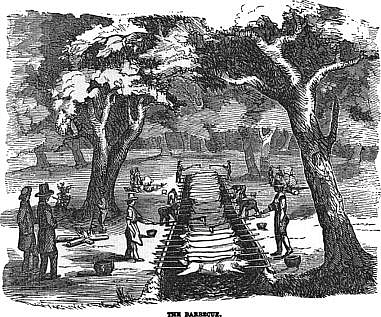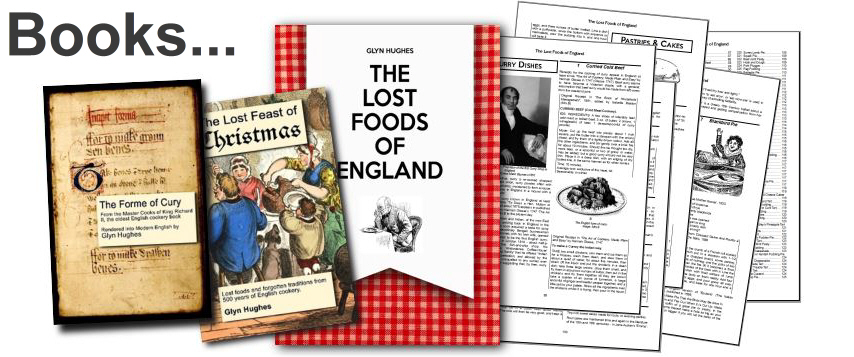

|
 The term 'barbecue' possibly comes from the Spanish word for a raised trestle and is known as a method of cooking in England, especially in a social, outdoor manner, since the early 18th Century.  Early 19th Century Barbecue From: 'Revolutonary Reminisceces' New York, USA, 1860 The English weather has never been hugely favourable to barbecuing, so that even the earliest receipt (Bradley 1728) recommends; "This should be done in a Yard, or Garden, with a Covering like a Tent over it." This has led to distinct difference in barbecue food culture in England. In more stable climes, the barbecue commonly includes a range of foods which benefit from long, slow cooking (whole beasts or large meat joints, pastries &c) whereas England requires foods which can be cooked very quickly (thin meats &c) during the short interval between one rainstorm and the next. That barbecuing is now thought of as rather a male preserve may not be a new idea, considering this, from the 'Dublin Morning Register' - Tuesday 28 March 1837 GOING THE WHOLE HOG - "Going The Whole Hog" is an expression of recent origin. it has come into use from the "barbecue" of the west, which is a hog, or ox, or bear, roasted whole, for large dinner parties consisting of men only - as in England in celebrating the coming of age of young men of rank and fortune. "Do you give joints or barbecue?" Oh, we go the whole hog." That is the manner in which the phrase came into use. Round about 1750 Samuel Foote's play 'The Patron' has; "I am invited to dinner on a barbicu" The modern barbecuist might care to see: Skuetts, Minced Collops, Yorkshire Collops, Pork Lozenges  Original Receipt in 'The Country Housewife and Lady's Director' by Prof. R Bradley, 1728 (Bradley 1728) Original Receipt in 'The Country Housewife and Lady's Director' by Prof. R Bradley, 1728 (Bradley 1728)An Hog barbecued, or broil'd whole. From Vaux-Hall, Surrey. Take an Hog of five or six Months old, kill it, and take out the Inwards, so that the Hog is clear of the Harslet; then turn the Hog upon its Back, and from three Inches below the place where it was stuck, to kill it, cut the Belly in a strait Line down to the Bottom, near the joining of the Gammons; but not so far, but that the whole Body of the Hog may hold any Liquor we would put into it. Then stretch out the Ribs, and open the Belly, as wide as may be; then strew into it what Pepper and Salt you please. After this, take a large Grid-Iron, with two or three Ribs in it, and set it upon a stand of Iron, about three Foot and a half high, and upon that, lay your Hog, open'd as above, with the Belly-side downwards, and with a good clear Fire of Charcoal under it. Broil that side till it is enough, flouring the Back at the same time often. Memorandum, This should be done in a Yard, or Garden, with a Covering like a Tent over it. When the Belly-part of the Hog is enough, and turn'd upwards, and well fix'd, to be steady upon the Grid-Iron, or Barbacue, pour into the Belly of the Hog, three or four Quarts of Water, and half as much White-Wine, and as much Salt as you will, with some Sage cut small; adding the Peels of six or eight Lemons, and an Ounce of fresh Cloves whole. Then let it broil till it is enough, which will be, from the beginning to the end, about seven or eight Hours; and when you serve it, pour out the Sauce, and lay it in a Dish, with the Back upwards. Memorandum, The Skin must not be cut before you lay it on the Gridiron, to keep in the Gravey; neither should any of the Skin be cut, when you have any Pork roasted for the same Reason.  |
|
MORE FROM Foods of England... Cookbooks ● Diary ● Index ● Magic Menu ● Random ● Really English? ● Timeline ● Donate ● English Service ● Food Map of England ● Lost Foods ● Accompaniments ● Biscuits ● Breads ● Cakes and Scones ● Cheeses ● Classic Meals ● Curry Dishes ● Dairy ● Drinks ● Egg Dishes ● Fish ● Fruit ● Fruits & Vegetables ● Game & Offal ● Meat & Meat Dishes ● Pastries and Pies ● Pot Meals ● Poultry ● Preserves & Jams ● Puddings & Sweets ● Sauces and Spicery ● Sausages ● Scones ● Soups ● Sweets and Toffee ● About ... ● Bookshop ● Email: editor@foodsofengland.co.uk COPYRIGHT and ALL RIGHTS RESERVED: © Glyn Hughes 2022 BUILT WITH WHIMBERRY |